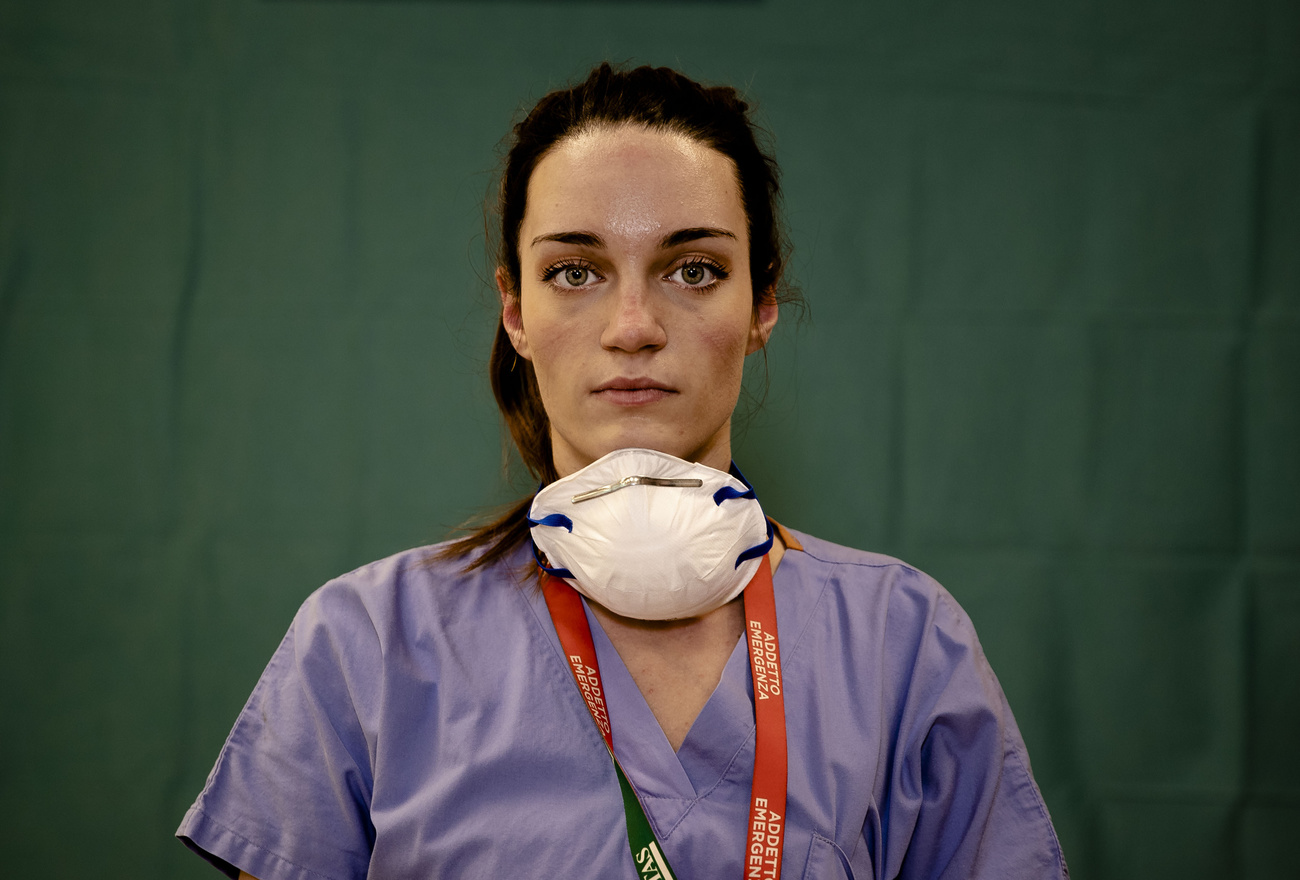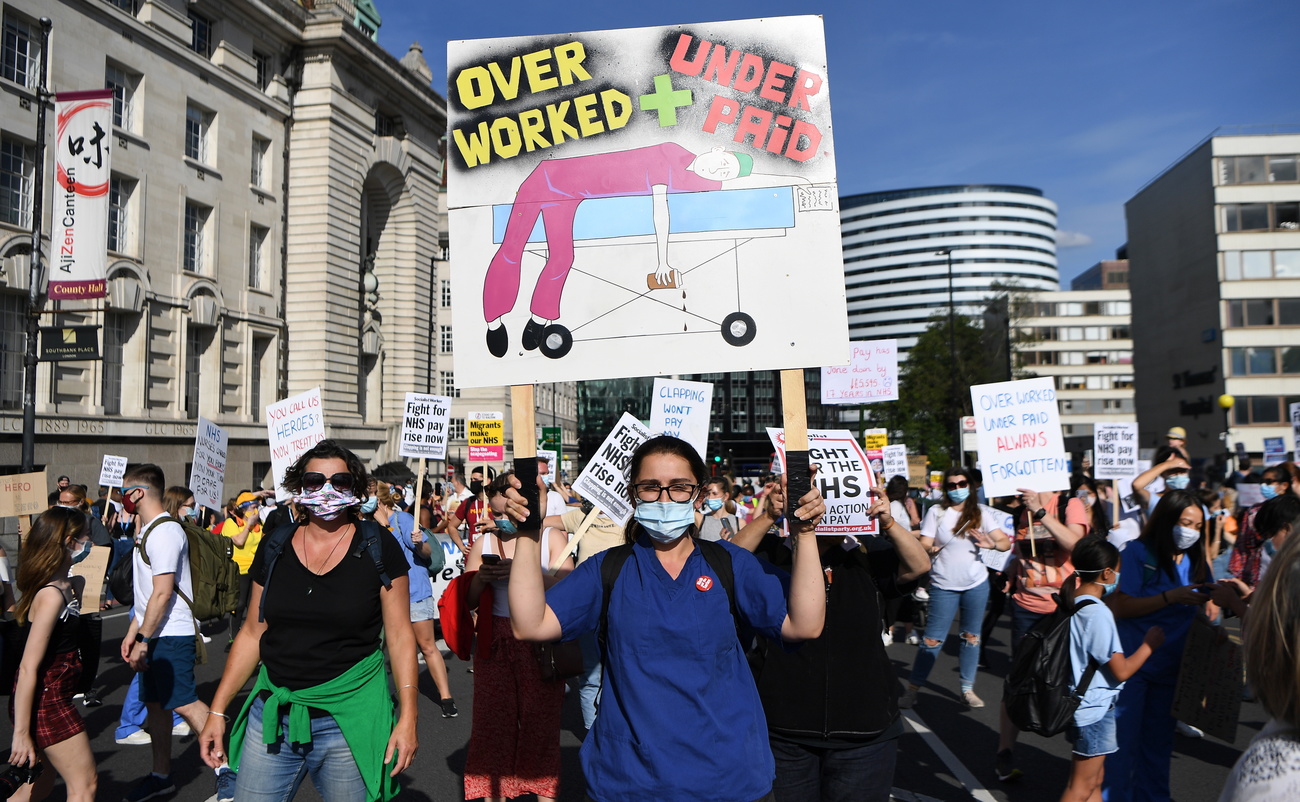Swiss voters to decide on how to solve the nursing crisis

During the Covid-19 pandemic, Switzerland has been confronted by a major shortage of nurses. While everyone agrees that something must be done, the health sector and parliament are split on how best to resolve the issue. Swiss voters will decide in a nationwide vote on November 28.
“Every day there was nurse on sick leave and no one to replace her. I was very stressed at work. I was on edge when I came home and I took my frustration out on my family,” Carole R*, a registered nurse specialising in surgery and intensive care, revealed during our investigation in May 2020. Her experience is typical of nurses’ working conditions in Switzerland: understaffed, stressed, and poorly paid.
Applauded from the balconies during lockdown, nurses are now calling for action to resolve a problem which is long-standing, but which the pandemic has brought into sharp focus. In this context, on November 28 the Swiss people will vote on the people’s initiative “For strong nursing care”, or the nursing initiative for short, which aims to improve conditions for nurses and careworkers.
How bad is the shortage of nurses?
The need for skilled nurses has increased steadily over the years as the population has aged, but Switzerland does not train enough qualified personnel. Added to this is a high drop-out rate: 46% of nurses leave the profession. This means that if nothing is done, Switzerland will need an additional 65,000 nurses by 2030, according to the Swiss Health Observatory.
To meet its needs, Switzerland recruits massively from neighbouring countries. A third of all nurses working in Swiss hospitals are foreigners. But this dependency on foreign workers can pose problems, as highlighted by the pandemic. When countries closed their borders to limit the spread of the virus, Switzerland was forced to negotiate with its neighbours to allow health workers to continue to cross the border to work.
What is the initiative calling for?
In 2017, the Swiss Nurses’ Association launched a people’s initiative proposing several solutions to improve conditions for nurses.
First, the nursing initiative calls on the government and cantons to train enough registered nurses in Switzerland. Second, it says the profession needs to be properly valued, which would be achieved by the government guaranteeing certain working conditions and setting salary rates.
According to an Organisation of Economic Co-operation and Development (OECD) health survey published in 2019, the pay of nurses compared to the average salary in Switzerland is one of the lowest amongst member countries.
The initiative’s backers say the government should also reform professional development paths in the sector to facilitate new career prospects.
Finally, the initiative wants to enable nurses to bill some services directly to insurance companies without the need for a medical prescription, as is currently required.
What’s in parliament’s indirect counter-proposal?
The government and parliament also want to strengthen nursing care and rectify the shortage of nurses, but argue that the people’s initiative goes too far. Parliamentarians have adopted an indirect counter-proposal, which meets two of the Nurses’ Association’s demands to encourage training and broaden the capacity of nurses to act independently.
The counter-proposal calls for an investment of CHF1 billion (CHF1.09 billion) over eight years in training and further education. Like the initiative, it also proposes that nurses be able to bill certain services directly to insurance companies without the need for a medical prescription. To prevent health costs ballooning, the counter-proposal outlines a control mechanism that will be put in place to accompany the measure.
Why will voters get to decide?
In 2017, the Nursing Association collected 120,000 signatures in favour of the initiative. Unconvinced by parliament’s indirect counter-proposal, the initiative committee decided not to withdraw its text. As a result, Swiss voters will decide. If they accept the initiative, the counter-proposal will be dead. If they reject it, the counter-proposal will be adopted.
What are the main arguments in favour of the initiative?
The initiative’s supporters say that while the counter-proposal focuses on investments in training, it does not include enough measures to improve the quality of care and working conditions in the sector. The initiative committee says this is key to preventing early career dropout and argues the proposed investments will be wasted unless complementary measures are enacted.
The ‘yes’ camp maintains that satisfaction at work essentially depends on the number of nurses per team, on opportunities for personal development and on wages. It is also essential that Switzerland trains more of its own nurses so that it doesn’t need to depend on foreign workers. The view of the Nurse’s Association is that only the initiative will guarantee quality of care and patient security.
What are the arguments against the initiative?
The ‘no’ camp believes the initiative goes too far because, among other things, it demands that the government set working conditions and salaries. Opponents say this is not the role of the government but is the responsibility of institutions, social partners and cantons.
Opponents also argue that basic medical care is already enshrined in the Swiss constitution and that, as such, it is not necessary to specifically mention nurses, which would create a privileged statute for a professional category.
Direct billing of services could also lead to ballooning health costs, they warns. They prefer the counter-proposal, which attaches a control mechanism to this measure.
Opponents finally argue that the measures contained in the counter-proposal, having already been agreed by parliament, could be rapidly implemented and would rectify the shortage problem sooner. Implementing the initiative would take longer, because the government and parliament would have to first draft a new law.
Who is for? Who is against?
Those in favour of the initiative are mostly on the left of the political spectrum, such as the Social Democrats and the Greens, while the parties on the right and centre prefer the counter-proposal.
The health sector in not in total agreement either. Although the Nurse’s Association, doctors and patients’ organisations, and big trade unions support the initiative, four old-age care associations support the indirect counter-proposal, arguing that it is substantial and balanced, and that it has the advantage of being implemented quickly.
Translated from French by Sophie Douez
More

In compliance with the JTI standards
More: SWI swissinfo.ch certified by the Journalism Trust Initiative














You can find an overview of ongoing debates with our journalists here . Please join us!
If you want to start a conversation about a topic raised in this article or want to report factual errors, email us at english@swissinfo.ch.